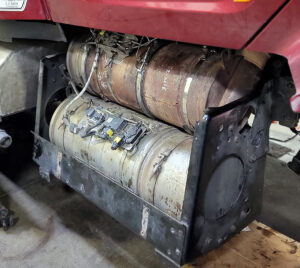Heavy-duty trucks play a vital role in our everyday lives. These trucks are designed to carry large payloads and travel long distances, making them an essential component of the transportation sector. However, these trucks also significantly impact the environment due to their emissions. As a result, the development of aftertreatment systems has become increasingly important for modern Class 8 trucks to reduce their environmental impact. Over the past few years, there has been much controversy regarding these systems, but if they are used properly and maintained, they can provide years of trouble-free service and help protect our environment.
An aftertreatment system is essential to a modern truck’s exhaust system. It is designed to reduce harmful emissions that are produced during the combustion process. These emissions include nitrogen oxides (NOx), particulate matter (PM), and carbon monoxide (CO), which can have a detrimental impact on the environment and human health. Aftertreatment systems use various technologies to remove these harmful emissions from the exhaust stream before they are released into the atmosphere. These emissions significantly contribute to air pollution and have been linked to various health problems, including respiratory diseases and cancer. By reducing emissions, aftertreatment systems help to create cleaner and healthier air for people to breathe.
One of the most common technologies used in aftertreatment systems is the diesel particulate filter (DPF). The DPF is designed to capture and remove particulate matter from the exhaust stream. It uses a ceramic filter that traps soot particles as they pass through the exhaust system. The trapped particles are then burned off during a process known as regeneration, which converts the soot into ash and releases it from the filter. This process helps to reduce the amount of particulate matter released into the atmosphere.
Another technology commonly used in aftertreatment systems is the selective catalytic reduction (SCR) system. The SCR system uses a catalyst to convert nitrogen oxides (NOx) into harmless nitrogen and water. The system injects a urea-based solution, known as diesel exhaust fluid (DEF), into the exhaust stream. The DEF reacts with the NOx in the presence of the catalyst, breaking it down into nitrogen and water. This process helps to reduce the amount of NOx released into the atmosphere.
In addition to reducing emissions, aftertreatment systems can improve the fuel efficiency of Class 8 trucking rigs when used correctly and regularly maintained in conjunction with the OEM’s maintenance intervals. By reducing the amount of work required by the engine to overcome the resistance of the aftertreatment system, the engine can operate more efficiently, resulting in lower fuel consumption. This reduces the cost of operating the truck and the amount of greenhouse gases emitted during operation.
Another benefit of aftertreatment systems for Class 8 trucks is that they help to comply with today’s strict emissions regulations. The Environmental Protection Agency (EPA) has established very strict emissions regulations for heavy-duty trucks to reduce their overall environmental impact. These aftertreatment systems are essential to meeting these regulations, as they help reduce emissions and ensure compliance with the EPA’s current standards.
We here at Pittsburgh Power understand that certain aspects of the industry have gotten complicated over the last few years. Between fuel pricing and parts availability, the aftertreatment system has become more of a hindrance than a benefit to the owner operators in this business. Because of this, some have gone so far as to delete the system entirely, in an effort to be rid of the headache. This will not only cost you money in the long run, but it could also irreparably damage your engine if not done by someone with vast knowledge of the mechanical and programming aspects involved.
The aftertreatment system need not be a headache. With regular parked regens, limited idling, and a regular DPF cleaning interval, this equipment will serve you for many years with little or no issues. In tandem with our Max Mileage Fuel Borne Catalyst and DPF Alternative ultrasonic cleaning services, the maintenance of this system becomes even easier. Visit our website to learn more about these products and be sure to listen to us on “The Power Hour” every Tuesday at 11:00 AM ET, hosted by Kevin Rutherford, on his new platform, Audio Road. Download the app today for all Android and Apple devices.
Another exciting development here at Pittsburgh Power is our return to Sirius XM on the Road Dog Network (Channel 146). Be sure to tune in to our new show “The Pit Stop” hosted by Dave Nemo every Monday at 10:00 AM ET. I would like to thank Jordan Greathouse for helping me with this article and remind you all – we are here to help make your truck more efficient and more fun to drive, so let us do what we do. Stop by our repair shop in Saxonburg, PA, call us at (724) 360-4080, send us an email to information@pittsburghpower.com or visit our website at www.pittsburghpower.com today.

